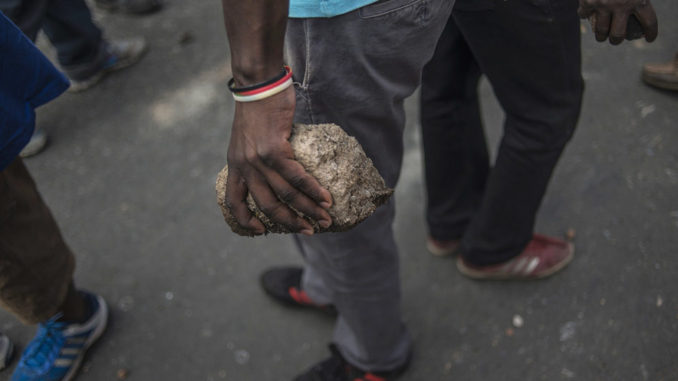
Recent reports that Nigerians are being maltreated in a neighbouring West African country, Ghana are alarming, especially at a time the Economic Community of West African States (ECOWAS) just joined the rest of Africa and signed a remarkable trade agreement for the continent.
Specifically, it is high time that the Federal Government did something about its foreign policy thrust on xenophobic attacks on Nigerians. Nigerians should not be made endangered species in any country. This is unacceptable. That robs us of our dignity.
According to reports, shops belonging to Nigerians were recently locked up by Ghanaian traders at the popular Opera Square Electronic Market in the central business district of Accra. The angry traders reportedly attacked Nigerian traders and sealed off their shops. But some Nigerian traders were said to have resisted in self-defence, which led to a brawl, before the police took control of the situation.
The leadership of the Ghana Union of Traders Association (GUTA) and executives of the Nigeria Union of Traders Association in Ghana (NUTAG) were summoned by the Accra Regional Police Force to resolve the matter.
According to the Accra Regional Operations Officer of the Ghana Police, Chief Superintendent Kwasi Ofori, measures were put in place to ensure that sanity prevailed.
That incident was the second time in recent weeks that Nigerian traders at the market had been attacked by the Ghana Electrical Dealers Association (GEDA).The first incident in June, when several shops were also locked up by GEDA was swiftly resolved and the shops reopened about 48 hours later. The latest incident, which was instigated a few days after the Ghanaian Parliament threw its weight behind the traders by insisting that foreigners must be barred from retail business in the country, was more pronounced.
Consequently, the President of GUTA, Dr. Joseph Obeng, reiterated that the ban on retail business by foreigners must be enforced. This was so curious.“These foreign retailers have found a loophole in our retail laws and are capitalising on that…We will not sit down and watch them take over our market,” Obeng reportedly stated. This obvious official endorsement, no doubt, sparked off the attack against Nigerian traders. We strongly condemn the unwarranted rage against Nigerian traders in Ghana. And we would like to see a dialogue between Nigerian and Ghanaian authorities to find a lasting and amicable solution to this strange emerging xenophobia in West Africa.
The anti-Nigerian sentiment in many countries is subsisting due to the failure of the Federal Government to promptly reciprocate any unfriendly treatment against Nigerians anywhere. Government is, completely at liberty to respond appropriately, as a way of ending the xenophobia.
For instance, this is not the first time Ghana had maltreated Nigerians. Last January, Ghana deported 723 Nigerians on alleged illegal stay, cybercrime and prostitution between January 2018 and January 2019. The Ghanaian government clearly acted then based on mere suspicion without thorough investigation.
Whereas the Nigerian High Commissioner to Ghana, Michael Abikoye merely protested against the ill-treatment meted out to Nigerians by the Ghanaian Immigration Service (GIS), the authorities in Abuja did absolutely nothing more. This might have given Ghana the impetus the other day to deport a Nigerian professor on a flimsy charge.
While we don’t condone any form of criminality on the part of Nigerians, inhuman treatment and torture of Nigerians in Ghana should no longer be tolerated by the Nigerian government.It is unfortunate that the Nigerian traders’ shops were sealed not for any criminality but for doing legitimate business. If Nigerians are barred from engaging in retail trade, what then is the essence of the ECOWAS protocol that guarantees free movement and settlement of nationals of member countries within the community? The same ECOWAS is currently planning to introduce a common currency within the sub-region to enhance trade activities.
We recall that at the height of Ghana’s economic woes in the 1970s, 1980s and 1990s, thousands of Ghanaians were in Nigeria engaged in all manner of menial jobs that, ordinarily, should be left to Nigerians, just to eke out a living and they were allowed to do so.
Ordinarily, what should be required of traders to own a shop is to register and pay the stipulated fees. Only then would those who refused to register can be sanctioned appropriately.
But to profile all Nigerian traders for such ill-treatment is in bad taste. There should be tolerance. Ghana should protect ECOWAS citizens doing legitimate business. It will be a disaster if the ECOWAS house is made to fall for lack of capacity to observe simple protocols freely agreed to govern members.
END

Be the first to comment